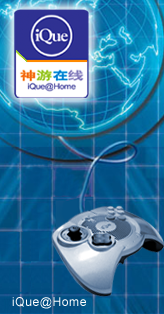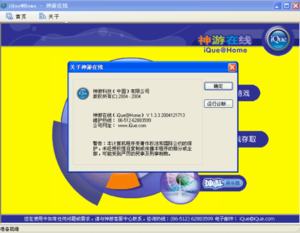Difference between revisions of "IQue@Home"
Jhynjhiruu (talk | contribs) m (Reverted edits by Jhynjhiruu (talk) to last revision by H.N.K.) |
Jhynjhiruu (talk | contribs) m (No, it really is iqahc.exe) |
||
| Line 100: | Line 100: | ||
* \base<br>Contains an executable named POSTINST.exe with unknown purposes.<br>The accompanying '''VERSION''' file reads "103032004121713" (File last updated in V 1.3 update?).<br>Not avaliable in version 1.3.2. | * \base<br>Contains an executable named POSTINST.exe with unknown purposes.<br>The accompanying '''VERSION''' file reads "103032004121713" (File last updated in V 1.3 update?).<br>Not avaliable in version 1.3.2. | ||
* \pkgs<br>Contains a '''VERSION''' file that shows the version of the current program. (Ex. '''104022005101909''' for V 1.4.2) | * \pkgs<br>Contains a '''VERSION''' file that shows the version of the current program. (Ex. '''104022005101909''' for V 1.4.2) | ||
| − | * \pkgs\core\bin<br>Contains the program's main executable ''' | + | * \pkgs\core\bin<br>Contains the program's main executable '''iqahc.exe''' |
* \pkgs\core\share\xlate<br>Contains a filed named '''GB2312''', which is a complete GB2312-80 to Unicode table. ('''[https://en.wikipedia.org/wiki/GB_2312 GB2312]''' is a character encoding method used in China) | * \pkgs\core\share\xlate<br>Contains a filed named '''GB2312''', which is a complete GB2312-80 to Unicode table. ('''[https://en.wikipedia.org/wiki/GB_2312 GB2312]''' is a character encoding method used in China) | ||
* \diag<br>Contains the diagnosis program [[ique_diag.exe]].The accompanying '''VERSION''' file reads "103042005031806" (File last updated in V 1.3.4 2005031806 update?).<br>Not avaliable in version 1.3.2. | * \diag<br>Contains the diagnosis program [[ique_diag.exe]].The accompanying '''VERSION''' file reads "103042005031806" (File last updated in V 1.3.4 2005031806 update?).<br>Not avaliable in version 1.3.2. | ||
Revision as of 02:33, 1 May 2018
iQue@Home (Chinese name: 神游在线, literally "iQue Online") is a Windows application developed by iQue. It was first publicly released on Oct 28, 2004[1]. Before the software was introduced, iQue Player owners could only purchase software and re-retrieve previously purchased games from an iQue Depot.
An iQue Player with a non-iQue@Home SKSA is incompatible with iQue@Home (via USB) unless its SKSA is updated. Compatible units display the iQue@Home logo at the top-left corner of the title screen.
Known versions
1.3.2
This is the version that comes with both the iQue GBA SP CD-ROM and the iQue@Home CD-ROM, and it can be downloaded from iQue.com. There are two files: iQue@Home-standard.rar and iQue@Home-complete.rar. The former file is 1.2MB whereas the latter is 205MB. The only difference between the downloads is that iQue@Home-complete has most of the encrypted games under /data/cache/.
iQue@Home-complete can also be downloaded as a torrent, likely for faster download speed since most consumers had slow internet download speeds in the mid-2000s. The torrent is no longer seeded.
Based on the version information, 1.3.2 was likely built on September 24, 2004:
Version information:
(C) 2004-2004
V 1.3.2 2004092411
1.3.3
There is not much information regarding this version. The only evidence for its existence is a single image on a web page of iQue@Home support. Version 1.3.3 is the earliest known version to include the diagnosis feature and the accompanying tool, ique_diag.exe. It is unknown whether it is an older build or identical to the one in v1.4.2.
Based on the version information, 1.3.3 was likely built on December 17, 2004:
Version information:
(C) 2004-2004
V 1.3.3 2004121713
1.3.4
There is not much information regarding this version. The only evidence for its existence is the version file accompanying ique_diag.exe in Ver 1.4.2, which reads "103042005031806". Thus, Ver 1.3.4 could be the final revision of ique_diag.exe.
Based on the version information, 1.3.4 was likely built on March 18, 2005:
Version information (derived, not officially known):
(C) 2004-2005
V 1.3.4 2005031806
1.4.2
This is the latest and final version of iQue@Home. In the past, users were able to update to the latest version via iQue@Home's update server, which became defunct even before the service's shutdown in December 2016. Version 1.4.2 cannot be downloaded from ique.com.
Based on the version information, 1.4.2 was likely built on October 19, 2005:
Version information:
(C) 2004-2005
V 1.4.2 2005101909
System Requirements
Based on the official download page, these are the system requirements of iQue@Home:
Hardware: Pentium II 350 or better CPU, and least one USB port.
Internet: Broadband, narrowband or wireless internet connection.
iQue@Home itself can be executed on 64-bit Windows systems. However, since the drivers for iQue Player are only made for 32-bit systems, it is impossible to buy, store or retrieve games on a 64-bit computer, rendering the program useless.
Features
Supported Features
Translated from the official download page:
Besides allowing you to easily buy games at home, iQue@Home also allows you to enjoy various other features, including:
- Store/Retrieve games for free
- Update iQue Player for free
- Try the newest game demos for free
- Earn points as a member
- Redeem gifts using points
Planned (Scrapped) Features
These features were planned for the iQue@Home, but were ultimately scrapped.
Evidence can be found on the official download page:
- Distant (Online) multiplayer
- Distant communication between gamers (Online voice/text chat?)
- Gameplay tips & advice (iQue's equivalent of Nintendo Power Hotline?)
File Structure
\iQue@Home (root)
- 神游在线(iQue@Home)
A url link to iQue's index page. - uninst.exe
Program uninstaller. - SERVER
A file with a single string - rms.idc.ique.com. The iQue@Home updater uses this string as its base when searching for updates. - VERSION
A file with the Version information concatenated into a string of numbers,
for instance V 1.4.2 2005101909 (shown in the "about" window in iQue@Home) is concatenated into 104022005101909.
\iQue@Home\data
- \cache
Stores games, apps, and SKSA cache locally using this rule. - \etc
Stores two files named ahc.conf0 and ahc.conf1. - \incoming
Temporary storage for content cache when they are being downloaded from the server. Uses the same rule as in /cache. - \logs
Stores user activity within iQue@Home (pages visited, download requests, etc). A file named logsnote also seems to store ique_diag.exe diagnosis info. - \tmp
Store content png images extracted from ticket.sys on the console.
íQue@Home/pkgs
- \base
Contains an executable named POSTINST.exe with unknown purposes.
The accompanying VERSION file reads "103032004121713" (File last updated in V 1.3 update?).
Not avaliable in version 1.3.2. - \pkgs
Contains a VERSION file that shows the version of the current program. (Ex. 104022005101909 for V 1.4.2) - \pkgs\core\bin
Contains the program's main executable iqahc.exe - \pkgs\core\share\xlate
Contains a filed named GB2312, which is a complete GB2312-80 to Unicode table. (GB2312 is a character encoding method used in China) - \diag
Contains the diagnosis program ique_diag.exe.The accompanying VERSION file reads "103042005031806" (File last updated in V 1.3.4 2005031806 update?).
Not avaliable in version 1.3.2. - \driver
Contains only a VERSION file that reads "10302200409241".
Possibly used to document driver versions. - \loc
Contains a VERSION file that shows the version of the current program. (Ex. 104022005101909 for V 1.4.2) - \loc\res
Contains DLL file for offline pages. - \update
Contains the iQue@Home updater executable. VERSION file reads "103022004092411".

